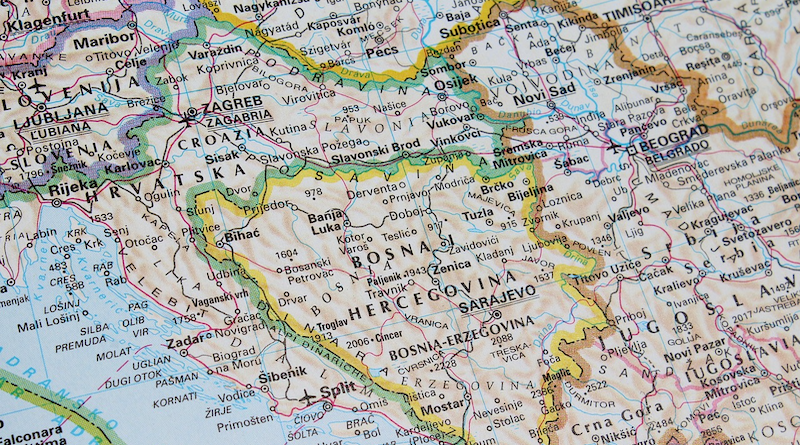On Migrant Route Through Croatia, More Police And More Foreign Smugglers – Analysis
By Vuk Tesija
Pressure is building on the Karlovac region of Croatia, situated on the shortest route between Bosnia and Slovenia for refugees and migrants trying to reach western Europe.
On September 10, two Turkish citizens arrived in Sarajevo by plane from Istanbul. Prior to leaving Turkey, they had arranged for smugglers to get them to France and Germany, for 4,000 euros and 6,000 euros respectively.
They were met on arrival in the Bosnian capital and taken to a location near the border with Croatia, joining another group of Turkish citizens. Overnight, they set out on foot, crossing the border at around 5 a.m. on September 11 after a three-hour walk. Several hours later, as agreed, a car driven by a Zagreb architect picked the group up, one of them squeezing into the boot. They only got 15 minutes down the road before the police stopped them.
The details of the journey come from accounts given by the Turkish citizens to prosecutors in Karlovac, southwest of the Croatian capital Zagreb, who have since filed an indictment against the architect, identified by the initials V.M.
V.M. faces the prospect of between one and eight years behind bars, but the threat of punishment has not deterred smugglers in Croatia – increasingly foreigners – who stand to make a lot of money from the flow of refugees and migrants across the European Union’s external borders.
According to 2023 data from the Croatian interior ministry, foreigners now account for 70 per cent of suspected people smugglers arrested in Croatia, including Serbs, Bosnians and Slovenians in October, and, most recently, Afghans and Uzbeks. Between January and October, a total of 1,103 were arrested, Croatian and foreign citizens, up from 672 over the same period of last year.
In the Karlovac region alone, police say acts of migrant smuggling were up 217 per cent over the same period, from 113 to 293.
In response, some 20 kilometres east of Karlovac in the village of Dugi Dol, authorities are converting a former military facility into a new migrant registration centre. The site has been fenced off and several dozen containers have been placed inside for accommodation.
Karlovac police said the centre would be operational “in the near future, as soon as the prerequisites for short-term accommodation and registration of migrants are met”.
Hitching a ride
The Karlovac region of Croatia sits on the shortest route between northwestern Bosnia and southern Slovenia; its wooded, hilly terrain provides good cover for refugees and migrants trying to cross borders undetected.
In a recent report submitted to parliament, the government said that the “greatest pressure continues to be in the area of the Karlovac Police Administration, where about a third of the operations related to illegal border crossing, i.e. about 21,500, were recorded”.
It cited a 73 per cent increase in police operations against illegal border crossings in the first ten months of this year, compared to the same period of last year.
The Karlovac police have received help from other units of the interior ministry; numbers are “adjusted depending on the security situation on the ground”, the police told BIRN.
In the Krnjak municipality, where the new registration centre is being built in Dugi Dol, Sinisa Spicijaric, a bartender at the Baza café, said migrants pass by every day. Often, they hitch a ride on trucks, unnoticed by drivers who stop at the café for a coffee break.
“Sometimes, truck drivers transport migrants without even knowing it,” said Spicijaric. “If the driver doesn’t notice that his seal has been removed or broken, they often manage to get into the truck.”
He showed BIRN a video shared on WhatsApp showing the moment a truck driver discovered a dozen migrants among his load.
“Over time, they learned how to open the trucks through the tarpaulin from above,” Spicijaric said, recounting the stories he had been told by truckers.“They know how to remove the screws from the door and get into the truck so as not to break the seal and put the screws back on the door so that it is not noticed that the door has been opened.”
Local resistance to registration centre
Rumour has it that the smugglers take 2,000 euros per migrant or refugee they spirit through Croatia, he said.
“Before they were much more visible; now they are quite hidden,” he said of the migrants and refugees. “It’s not that the circulation is less, but they are hiding more.”
“These are younger men from 16 to 30 years old. They go in groups, in which at least one person always has to speak English for communication. They are organised. They have topographical maps, cell phones, solar chargers, they don’t need electricity, they come equipped, and they have everything.”
But the police have visibly stepped up surveillance, Spicijaric told BIRN.
Though year-on-year the trend is going up, police in Karlovac said that cases of illegal migration were down in September and October.
Authorities insist migrants and refugees will not be housed long-term in Dugi Dol, but simply registered, photographed and fingerprinted before being moved elsewhere. Some residents of Krnjak protested, however.
Krnjak Deputy Mayor Josip Ljevar said the initial storm had passed.
“It’s better that migration is kept under police control,” he told the HINA news agency. “Those illegal migrants probably will not take this route anymore, because they will know that the police are there, that fingerprints are being taken…”
Trying to allay fears, the government has promised Krnjak funding for infrastructure including street lighting.
“I’m not afraid, but I have two children and I’m not comfortable,” said Spicijaric. “So far there haven’t been any excesses or complications. I hope it will stay that way.”

